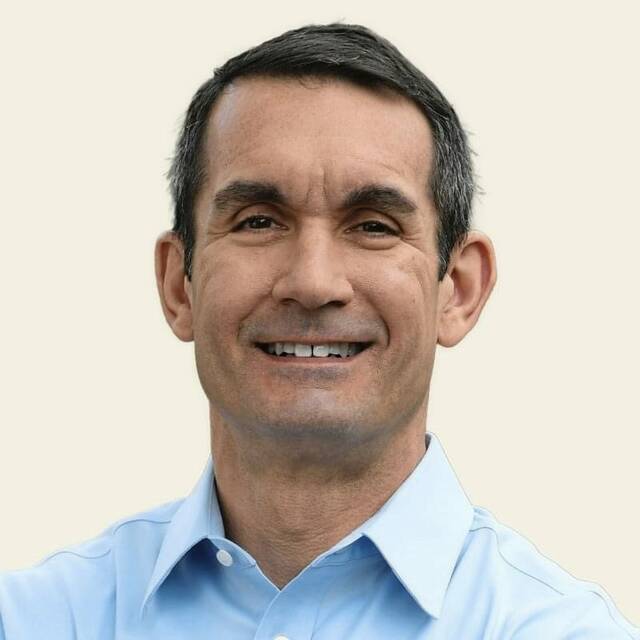Pennsylvania’s new Democratic chairman is pulling a page from Ronald Reagan’s playbook in an effort to unify and grow his party.
“We’ve got to get back to politics being a game of addition, trying to add to our coalitions and becoming a bigger tent,” Pennsylvania Democratic Chairman Eugene DePasquale said in an interview with TribLive.
Paraphrasing the former Republican president as he addressed ideological divisions among different factions in the Democratic Party, DePasquale said: “We’ve got to focus in on where we have 80% agreement on the issues. We’ve got to get back to understanding that if somebody agrees with us on all these core economic issues and some of the social issues, but maybe not all, that makes them a friend and an ally, not an enemy.”
DePasquale, 54, of Pittsburgh’s Uptown, was elected party chairman in early September. He replaced Sharif Street, a state senator from Philadelphia who has announced plans to run for Congress.
DePasquale previously served three terms in the state House and two terms as Pennsylvania’s auditor general. He came up short in his bid for attorney general last year, losing to Republican Dave Sunday.
DePasquale didn’t have the luxury of easing into his new role.
The Nov. 4 election features several key judicial races, including retention votes for three state Supreme Court justices and races for seats on the Commonwealth and Superior courts, in addition to county, municipal and school races. After those races are decided, attention will quickly turn to pivotal contests on next year’s ballot, including ones for governor, lieutenant governor, Congress, and the state House and Senate.
Other concerns in the early going have been filling key staff positions, raising money and increasing voter registration.
While Democrats still maintain a voter registration edge over Republicans in Pennsylvania, the gap has narrowed dramatically over the past decade.
In 2015, there were nearly 1 million more registered Democrats than Republicans, Department of State records show. Today, there are about 168,000 more Democrats than Republicans. In the past 10 years, the number of Democrats has dropped by 4.1%, while the number of Republicans has increased by 22% and the number of independents, non-affiliated voters and those in other parties has gone up by 29%.
That presents a real challenge for Democrats, said Dan Mallinson, associate professor of public policy and administration at Penn State Harrisburg.
“The erosion of the Democratic Party’s registration advantage in Pennsylvania is reflective of a long-term shifting in the voting patterns and party attachments of working-class voters, especially in western parts of Pennsylvania and the northern tier, and also in the movement of African American and Hispanic voters that we saw in the last election,” Mallinson said.
As many manufacturing jobs vanished, Mallinson said, “Individuals who were very tied to the Democratic Party in the past stayed Democratic voters for a while, but many have shifted, especially after (President Donald) Trump came onto the scene.”
Mallinson added that the surge in the number of independent and non-affiliated voters and ones in other parties “reflects that many people aren’t happy with either major party.”
“A lot of voters have seen candidates from both major parties come and go, but they haven’t seen their fundamental living situation change at all, (explaining why) you do see a growing number of people disaffiliating,” Mallinson said.
As for campaign fundraising, the Pennsylvania Democratic Party brought in more than $1.5 million and spent nearly $1.7 million this year through Sept. 30 to end the reporting period with about $108,000 on hand, Federal Election Commission records show. Its counterpart organization, the Republican Party of Pennsylvania, brought in $810,000 and spent $1.1 million during the same span to end the reporting period with about $361,000 on hand, records show.
Since that reporting period ended, Democrats announced early this month that Pennsylvania Gov. Josh Shapiro had donated $250,000 to the state committee to help it gear up for the elections in November and next year.
DePasquale said the party needs to reconnect with many voters in Pennsylvania after a difficult showing in the 2024 election, when Republicans carried the state in the presidential race; won a U.S. Senate race, 10 of the state’s 17 seats in the U.S. House and three statewide row offices; and retained a majority in the state Senate. Democrats retained a majority in the state House.
“I do think the Democrats got their eye off the ball in 2024. The economic challenges that were happening I don’t think were adequately addressed. So we’ve got to do a better job of reconnecting with folks, particularly when it comes to the economic challenges that they’re facing out there,” DePasquale said.
“We’ve got to do a better job of selling our brand of what we are to win some of those folks back,” DePasquale said. “We need to be reminding people what Trump is doing to their economy, why it’s bad and what we’re going to do to fix it.”
Tom Fontaine is director of politics and editorial standards at TribLive. He can be reached at tfontaine@triblive.com.

